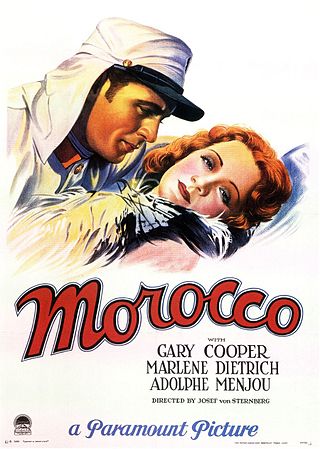
Morocco is a 1930 American pre-Code romantic drama film directed by Josef von Sternberg and starring Gary Cooper, Marlene Dietrich, and Adolphe Menjou. Based on the 1927 novel Amy Jolly by Benno Vigny and adapted by Jules Furthman, the film is about a cabaret singer and a Legionnaire who fall in love during the Rif War, and whose relationship is complicated by his womanizing and the appearance of a rich man who is also in love with her. The film is famous for a scene in which Dietrich performs a song dressed in a man's tailcoat and kisses another woman, both of which were considered scandalous for the period.

Josef "Sepp" Dietrich was a German politician and SS commander during the Nazi era. He joined the Nazi Party in 1928 and was elected to the Reichstag of the Weimar Republic in 1930. Prior to 1929, Dietrich was Adolf Hitler's chauffeur and bodyguard.

The Fortune of War is the sixth historical novel in the Aubrey–Maturin series by British author Patrick O'Brian, first published in 1979. It is set during the War of 1812 and much of the story takes place in Boston, Massachusetts.

Josef von Sternberg was an Austrian-born filmmaker whose career successfully spanned the transition from the silent to the sound era, during which he worked with most of the major Hollywood studios. He is best known for his film collaboration with actress Marlene Dietrich in the 1930s, including the highly regarded Paramount/UFA production The Blue Angel (1930).

Leila Hyams was an American actress who came from a show business family. Her relatively short film career began in 1924 during the era of silent films and ended in 1936. The blonde blue-eyed ingenue and leading lady appeared in more than 50 film roles and remained a press favourite, with numerous magazine covers.

The Password Is Courage is a 1962 British comedy-drama war film written, produced, and directed by Andrew L. Stone and starring Dirk Bogarde, Maria Perschy, and Alfred Lynch. It was based on the 1954 World War II biography of the same name of Sergeant-Major Charles Coward by Ronald Payne and John Williams Garrod. It was distributed by Metro-Goldwyn-Mayer.

The Secret War of Harry Frigg is a 1968 American comedy war film set in World War II. It was directed by Jack Smight and stars Paul Newman.
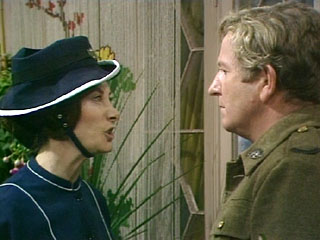
"Home Fires" is the sixth episode of the fourth series of the period drama Upstairs, Downstairs. It first aired on 19 October 1974 on ITV.
The Barksdale Organization is a fictional drug-dealing gang on the television series The Wire. Many of the characters featured in season one of The Wire belong to this organization. Season 1 largely deals with the Baltimore Police Department setting up a Major Crimes Unit to investigate the Barksdale Organization, led by Avon Barksdale who is portrayed as the most powerful drug kingpin in Baltimore.

It Always Rains on Sunday is a 1947 British film adaptation of Arthur La Bern's novel of the same name, directed by Robert Hamer. The film has been compared with the poetic realism movement in the French cinema of a few years earlier by the British writers Robert Murphy and Graham Fuller.
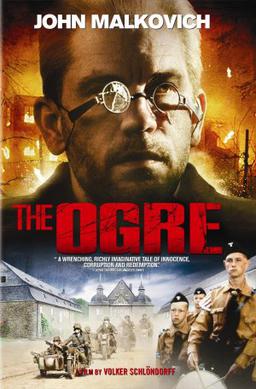
The Ogre is a 1996 French-German-British war drama film directed by Volker Schlöndorff and starring John Malkovich, Gottfried John, Marianne Sägebrecht, Volker Spengler, Heino Ferch, Dieter Laser and Armin Mueller-Stahl. It was written by Jean-Claude Carrière and Schlöndorff, based on the novel The Erl-King by Michel Tournier.

Percy Herbert was an English actor. He worked predominantly from the 1950s into the 1970s and became one of the most recognisable faces in post-war British cinema.
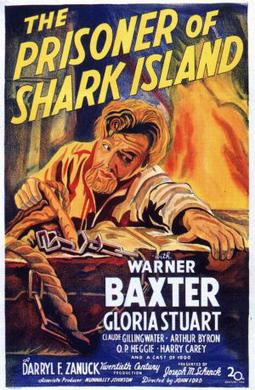
The Prisoner of Shark Island is a 1936 American drama film that presents a highly whitewashed and fictionalized life of Maryland physician Samuel Mudd, who treated the injured presidential assassin John Wilkes Booth and later spent time in prison after his unanimous conviction for being one of Booth's accomplices. The film was produced by Darryl F. Zanuck, was directed by John Ford and starred Warner Baxter and Gloria Stuart.
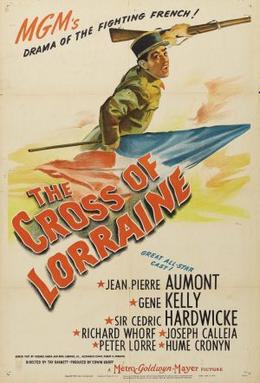
The Cross of Lorraine is a 1943 Metro-Goldwyn-Mayer war film about French prisoners of war escaping a German prison camp and joining the French Resistance. Directed by Tay Garnett, starring Jean-Pierre Aumont and Gene Kelly, the film was partly based on Hans Habe's 1941 novel A Thousand Shall Fall. The title refers to the French Cross of Lorraine, which was the symbol of the Résistance and the Free French Forces chosen by Charles de Gaulle in 1942.

Castle on the Hudson is a 1940 American prison film directed by Anatole Litvak and starring John Garfield, Ann Sheridan and Pat O'Brien. The film was based on the book Twenty Thousand Years in Sing Sing, written by Lewis E. Lawes, on whom the warden in the film was based. Castle on the Hudson is a remake of the 1932 Spencer Tracy prison film 20,000 Years in Sing Sing, also based on Lawes's book.
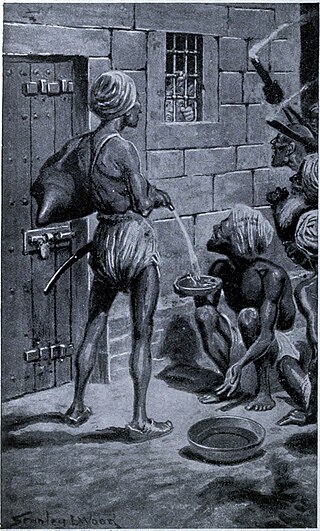
The Black Hole of Calcutta was a dungeon in Fort William, Calcutta, measuring 14 by 18 feet, in which troops of Siraj-ud-Daulah, the Nawab of Bengal, held British prisoners of war on the night of 20 June 1756. John Zephaniah Holwell, one of the British prisoners and an employee of the East India Company, said that, after the fall of Fort William, the surviving British soldiers, Indian sepoys, and Indian civilians were imprisoned overnight in conditions so cramped that many people died from suffocation and heat exhaustion, and that 123 of 146 prisoners of war imprisoned there died.
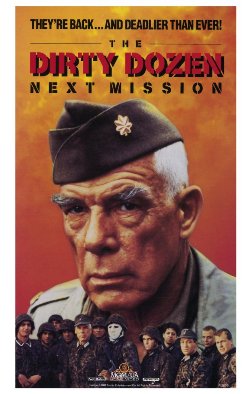
The Dirty Dozen: Next Mission is a 1985 made-for-TV film and sequel to the original 1967 film Dirty Dozen, directed by Andrew V. McLaglen and reuniting Lee Marvin, Ernest Borgnine and Richard Jaeckel 18 years after the original hit war film. Marvin returns to lead an all-new dirty dozen on a mission to assassinate SS General Sepp Dietrich, played by Wolf Kahler.
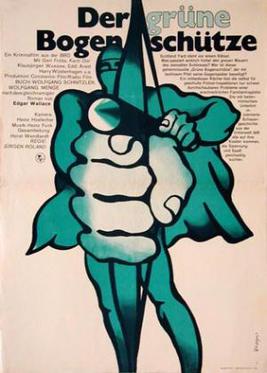
The Green Archer is a 1961 West German black and white crime film directed by Jürgen Roland and starring Gert Fröbe, Klausjürgen Wussow, Karin Dor and Eddi Arent. It is based on the 1923 novel The Green Archer by Edgar Wallace.
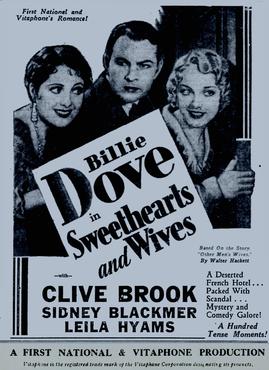
Sweethearts and Wives is a 1930 American pre-Code mystery film with comedic elements produced and released by First National Pictures and directed by Clarence G. Badger. The film stars Billie Dove, Clive Brook, Sidney Blackmer and Leila Hyams. The film was based on the 1928 West End play Other Men's Wives by Walter C. Hackett.

The Phantom of Paris is a 1931 American pre-Code drama film directed by John S. Robertson and written by Bess Meredyth, Edwin Justus Mayer and John Meehan. The film stars John Gilbert and Leila Hyams, and is based on the 1913 novel Chéri-Bibi and Cécily by Gaston Leroux. The film was released on September 12, 1931, by Metro-Goldwyn-Mayer. The studio simultaneously made and released a Spanish-language version, Chéri-Bibi, directed by Carlos F. Borcosque and starring Ernesto Vilches. A later 1955 French-Italian film Chéri-Bibi was based on the same novel.



















